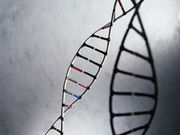Researchers say finding might help identify patients most likely to be helped by chemotherapy, radiation
WEDNESDAY, Aug. 31, 2016 (HealthDay News) — Fourteen genes have been identified that may help determine whether a cancer treatment could help a patient, according to a study published online Aug. 31 in Nature Communications.
The researchers first determined 14 genes that consistently over-express in a large number of cancers. The study team then created a scoring system (Centromere and kinetochore gene Expression Score [CES]) based on the degree of over-expression. A higher score meant more over-expression in those genes.
For several types of major cancers, the higher the score, the worse the prognosis for patients. But “another finding — one that is counterintuitive — is that high expression of these genes is also related to more effective chemotherapy and radiation therapy,” said principal investigator Gary Karpen, Ph.D., a senior scientist at the U.S. Department of Energy’s Lawrence Berkeley National Laboratory in California. The scores could then lead to predicting patient response to specific cancer treatments, according to the study team.
“Our results demonstrate the prognostic and predictive power of the CES, suggest a role for centromere misregulation in cancer progression, and support the idea that tumors with extremely high chromosomal instability are less tolerant to specific genotoxic therapies,” the authors conclude.
Full Text
Copyright © 2016 HealthDay. All rights reserved.








